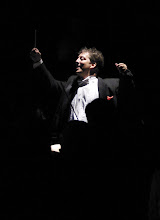
Berlin, 29 May 2000
Anyone who ever heard Erich Wolfgang Korngold play the piano, whether live or on recordings, has always been quick to remark about the incredible orchestral quality of his playing. Hugo Friedhofer, one of Hollywood's most prolific film composers and orchestrators who had worked with Korngold on several movies, remarked, "He had a fantastic way of playing the piano with an orchestral style, so you could almost sense what he was hearing in the orchestra." Thankfully, Korngold did record a few of his own piano works, namely two of the Sieben Märchenbilder and one movement each from the first and second sonatas. These recordings provide us with a real view of not only the pianism of the composer, but also of the approach to piano performance typical of the late 19th and early 20th centuries.
It was not unusual for pianists of that period to make certain additions in performance to a piece of music, along with seemingly infinite degrees of shading and color, to impart the illusion of an orchestral sound and texture. Much of this approach was influenced by both the pianism of Franz Liszt, who was famous for devising fantastic and previously unheard-of effects on the instrument, and the prevalence of orchestral and operatic transcriptions found on most piano recital programs at the turn of the century. On his recordings of his own music, Korngold’s playing often gives the illusion of an orchestral texture. In preparing for the performances heard on this compact disc, I transcribed some of the composer's own additions from his recordings to my scores. As Korngold once said, "I play two instruments, the piano and the orchestra--the orchestra is such a nice instrument on which to play."
The works on this recording show us a glimpse of the imagination of a miraculous child. Korngold's innate theatrical sensibilities, of imparting a story through music, were superior at a very young age. The Sieben Märchenbilder and Don Quixote show the same sophisticated tone-painting and highly developed sense of drama and timing that is evident in his later achievements as one of the most eminent composers of opera in Europe and film music in Hollywood. When asked about Korngold as a child prodigy, Hugo Friedhofer remarked, "I've seen music that he wrote at the age of ten or eleven that is fantastic, a set of piano things, Fairy-Tale Pictures..the invention, and the harmonic daring for them at the time!"
Korngold was always a man of the theater. Friedhofer, in recalling Korngold's eminence as a film composer, commented, "I know that Korngold had this sense of theater and of timing, and of stagecraft that began in his childhood. I recall many instances when Korngold would go to the producer and say, 'Look, can you give me a little more footage at the end…I feel that as the end of an act. I feel that there's a first act curtain there.' And he would always get his way. He was acting like a producer, actually, saying, 'I think that this would be more effective if it would occur after such and such happened.' And they listened to him, much to their advantage."
Friedhofer's observation confirms what any astute listener of Korngold's music has known all along: namely, that the composer did not distinguish between his works for the concert hall, opera house or film. All of his music was composed with the same depth of emotion, sense of drama and attention to form and detail. A Korngold film score can be performed in its entirety as a complete piece of music.
Such was my first experience encountering Korngold's works. I had the privilege of performing as piano soloist in his film score Between Two Worlds with John Mauceri conducting the Berlin Radio Symphony Orchestra. Some months previously, I had been the soloist with the Hollywood Bowl Orchestra and had my first rehearsal in Los Angeles at the Warner Brothers Studios on the same soundstage on which Korngold had conducted his movie soundtracks. In 1997, I was one of the performers in the official Korngold centenary concert in the composer's native Vienna. The composer was a victim of anti-semitism in death as well as in life: During a rehearsal for the concert, I discovered at the end of my score that a copyist from the 1930’s had written "Erich Wolfgang Kornfeld", one of several deliberate attempts at defacing the composer's name often encountered in original editions of his music composed during his period in Vienna. With a thick pen, I promptly crossed out the offending slur, and wrote KORNGOLD!, my humble attempt at correcting an affront committed some 65 years earlier.
As I write these notes on the day of the 103rd anniversary of Korngold's birth, it is wonderful to see his music enjoying a well deserved, long overdue renaissance. His works are being heard in concerts all over the world. The United States Postal Service recently honored him by putting his portrait on a postage stamp. Yet in 1957, the year of his death, it seemed as if Korngold would lapse into obscurity. The atonalists were the composers of the day and they debunked him as being too tonal, melodic, old fashioned. Korngold never lost the inner child in himself. His fertile imagination and individual style, so strongly evident in childhood, remained so through his whole life; he did not give into the 'isms' of his time-serialism, atonalism. Korngold’s beautiful music, composed in his own voice, embraces, inspires and ennobles the human spirit. In the final analysis, this is all that really matters.
This essay originally appeared in the CD booklet for my recording, The Complete Piano Works of Erich Wolfgang Korngold, on the Koch International Classics label.
© Alexander Frey, 2007
.
